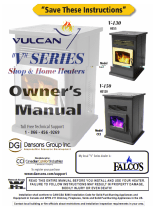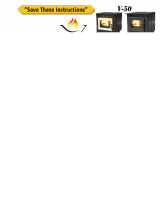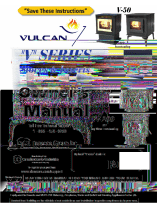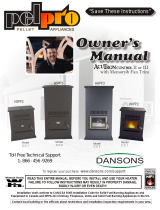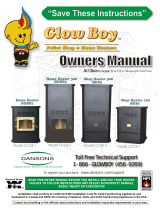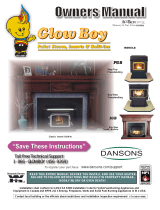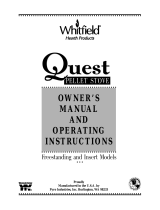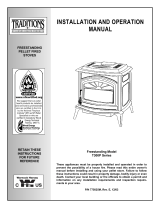Page is loading ...

PELLET STOVE
OPERATIONS
GUIDE
CAN/CSA B365 Installation Code For Solid-Fuel-Burning Appliances and Equipment in Canada and
NFPA 211 Chimney, Fireplaces, Vents and Solid Fuel Burning Appliances in the USA
Manufactured by
READ THIS ENTIRE MANUAL BEFORE INSTALLING YOUR PELLET STOVE/HEATER/INSERT. FAILURE TO
FOLLOW INSTRUCTIONS MAY RESULT IN PROPERTY DAMAGE, BODILY INJURY OR EVEN DEATH
For the following models: FPP, IPP, CC1, CC2, CC3, CCGB1, CCGB2, CCGB3 Installations shall conform to:
Manufactured for

Dear Pellet Appliance Owner,
UPDATES
Updated manuals, product registration and warranty information can be found on our website:
Thank you for selecting our wood pellet stove!
2
Sincerely,
Dansons Group Inc. and Canadian Comfort Industries
www.dansons.com/support
FOREWORD TO
NEW OWNERS
Congratulations on the purchase of your wood pellet appliance. You
have selected the finest in residential wood pellet heating technology.
This OPERATIONS GUIDE will walk you through the initial setup of
your pellet stove, from first light to fine tuned adjustments. We have
also included detailed information on cleaning and maintenance
as well as wood pellet fuel facts.
Please note the following points regarding stove installation and
pellet heating in general:
- Whether you install your stove yourself or hire a professional
installer, a quality installation is a must for the safety of your family
as well as efficient, satisfactory operation.
- Initial setup of the stove is the most important step to ensure
consistent, comfortable operation.
- Know the quality and characteristics of the pellets you burn.
Pellets can vary greatly from company to company, from load to
load and even from bag to bag.
- Be dilligent in your cleaning program.
- Remember that most operational dilemmas with pellet stoves arise
from improper installation, poor quality pellets, lack of timely
cleaning or incorrect air flow adjustment.
With a minimum amount of consistent care, your pellet appliance
will provide years of clean, efficient, comfortable and environmentally
sound heating.
We do NOT recommend pellet stoves as your only source of heat.
Do NOT install in a sleeping room.
Use of outside air is highly recommended with our pellet stoves, heaters and inserts.
Do not operate with the front door or hopper lid open.
Keep children, furniture, fixtures and all combustibles away from any heating appliance.
Installation and use of a carbon monoxide detector is highly recommended.

LIGHTING PROCEDURE
STARTUP CHECKLIST
2
A
B
C
D
1
3
The COMBUSTION FAN (exhaust) will start and operate at full speed for 60 seconds, then will slow
to match the startup rate
On a primed auger system, pellets will begin to fall into the BURN GRATE,
and the igniter will automatically ignite pellets in approximately
3 to 7 minutes.
During first-time startup procedure,
your auger system IS NOT PRIMED
(meaning pellets have not filled the
entire auger system yet). To solve this,
simply press theSTART / FEED RATE
button again.
Please make certain you have completed the
following checklist before proceeding:
Unit is plugged into a 3 pronged grounded outlet
Burn pot is clean, level & seated properly
Front door of the stove is closed
Screened pellets are in the hopper
Pellet fuel complies with PFI standards (pelletheat.org)
Unit is NOT plugged into a GFI outlet (ground fault interruptor)
.
.
.
.
.
.
.
.
.
.
Used only PL or L approved venting
Sealed vent connections with high temp RTV sealant
and allow sealant to cure for 24 hours
Make sure #1 trim pod is set to 9 o’clock position
Air inlet damper is OPEN to between 1/4” and 1/2”
4Adjust FUEL RATE and FAN
SPEED to your desired settings
(see PELLET STOVE ADJUSTMENTS
section).
NOTE: New stoves can emanate an odor during the initial few hours of burning while the paint cures.
Ventilating the room is strongly recommended until the odors disappear.
SAMPLE GRATE
WITH PELLETS
BURN
POT SAMPLE IGNITER
HOPPER
PRIMED
AUGER
SYSTEM
If the fire does not start, your stove will continue to feed pellets and
run the fans for 15 minutes. The stove will then automatically shut off.
STARTING UP
YOUR PELLET STOVE
If the stove fails to ignite a second time, refer to the TROUBLESHOOTING
section of your manual or contact your pellet stove dealer.
We STRONGLY recommend the use of a surge protector
to protect the circuitry in your control board.
(see ‘Initial Setup’ section on page 4)
(see pg 5)
FOR NEW INSTALLATIONS:
Push firmly on the START / FEED RATE button.
Procedures listed will work with both
AcuTron II & AcuTron III control boards.
The CONVECTION FAN (heat circulation) will start and the LED will go solid on LOW setting
The AUGER CYCLE LED will go solid for 3 seconds indicating the signal is being sent to auger motor
The IGNITER LED will light up solid and the igniter will begin to heat up
3

INITIAL SETUP
1
2
Slide open or close the damper as needed to obtain a
fire that is brisk enough to carry ash out of the grate, but
not so brisk that it carries whole pellets out as well; this is
known as popcorning.
Normally, you should find that the damper will need to be
1/4” to 1/2” open. This may vary with length of vent run,
pellet quality and elevation. The best way to set this is at
feed rate #4. Adjust the damper rod 1/8” at a time, letting
the stove burn for 1-2 minutes per adjustment, until pop-
corning ceases.
Popcorning is the result of incorrectly set air flow, causing fresh
unburned pellets (or barely ignited pellets) to be carried out of
the burn grate and into the ash bin by high air flow. This occurs
before more pellets have fallen into the burn grate (ie. It’s AIR
that carries the pellets out, not the impact of newly dropped
pellets. See SPARKING). A pellet that has been ‘popcorned’
out of the burn grate can glow for anywhere from several
seconds to several minutes.
andFigures
Damper
Rod
(normally
located
on rear side
panel)
Damper
Rod
(inside
stove)
Fresh Air
Inlet
show popcorning at #1 feed rate.
AIR INLET DAMPER
DEFINITIONS
POPCORNING
Sparking occurs from the impact of fresh pellets being dropped
into the burn pot and knocking parts of burning pellets out. Also,
the natural burning of wood can create sparks. Sparks will glow
in the ash bin generally for several seconds before burning out.
SPARKING
PLEASE NOTE: Sparking is normal. Popcorning can be
remedied by following step 2 above.
It is critical for the correct operation of your stove that the burn grate, air
inlet damper, combustion fan speed and fuel rate be set correctly!
START THE APPLIANCE AS PER THE LIGHTING INSTRUCTIONS.
The igniter light MUST be off in order to begin further adjustments; this
can take from 10-15 minutes to occur. Let the stove run until the
igniter light goes off, then push the START / FEED RATE button several
times until feed rate #4 LED lights up. Let stove run for 10-15 minutes.
Now you will adjust the air inlet damper. This will have to be set
because the factory must be able to accomodate a wide range
of installations and elevations as well as fuel length and quality.
PELLET STOVE
ADJUSTMENTS
A
A
shows sparking at #4 feed rate.Figure C
B
B
C
4
AIR
FLOW
PELLETS BLOWN OUT
OF BURN GRATE

3
A
B
FINE TUNING YOUR STOVE
FUEL
FEED RATE
SETTING #1
(LOW)
FUEL
FEED RATE
SETTING #4
(HIGH)
INCREASES
feed rate
DECREASES
feed rate
Do NOT use a metal object to adjust your trim
pods. Try using a plastic non-metallc object
(eg. insulated shaft screwdriver, pen cap, etc.)
Fuel feed rate at the lowest (#1) and highest (#4) settings can be changed by adjusting
the #1 or #4 trim pods located on the control panel.
To INCREASE fuel feed rate, turn the trimmer COUNTER CLOCKWISE.
To DECREASE fuel feed rate, turn the trimmer CLOCKWISE.
WARNING: Adjusting FEED RATE #1 too low (clockwise) may cause your stove to shut down.
PELLET STOVE
ADJUSTMENTS
Once the damper rod is set and your pellets are burning steadily (ie. no
popcorning), you are ready to fine tune your stove. Fine tuning is required
due to the differences in installation configuration, geography, insulation
of the home, and quality of pellets.
First, switch to feed rate #1 by pressing the START /
FEED RATE button until the #1 LED lights up.
Turn the #1 trim pod COUNTER CLOCKWISE until
the dial stops, then turn back to 9-3 o’clock
position as illustrated.
By adjusting these trim pods as described above,
you are ensuring that your stove is now at its
optimal settings. You may need to adjust the
feed rates after a few days of burning.
Turn the #4 trim pod CLOCKWISE until the dial
stops, then turn back to 9-3 o’clock position as
illustrated.
TRIM PODS
WITH FACTORY
DEFAULT SETTINGS
COUNTER-
CLOCKWISE
CLOCKWISE
FUEL RATES
At this point, your stove should still be running on
the #1 setting (low). Let this burn for approximately
10 minutes before making any further adjustments.
IMPORTANT: The #1 and #4 trim pod dials ONLY adjust fuel feed rates 1 and 4.
5

The performance of your pellet appliance is greatly affected by the type and
quality of wood pellets burned. As the heat output of various brands of pellets
differs, so will the performance and heat output of your appliance.
We recommend the use of screened pellet fuel in order to
reduce the amount of fines your stove will have to cope with.
PELLET QUALITY
WOODWOOD
PELLET FUEL
Your pellet stove is designed to burn APFI/FFI ‘Premium’
or ‘Standard’ quality wood pellets. Pellets that are soft
contain excessive amounts of loose sawdust, have been
or are wet, and produce clinkers or heavy ash will result
in reduced performance and may actually cause the
fire to go out.
PELLET CONSUMPTION
Fuel consumption will vary somewhat between fuel brands and stoves. The following ‘rough
guide’ to pellet usage may be useful in assessing your stove’s operation, for ordering fuel
and in providing information to your authorized pellet stove dealer.
FACTORS AFFECTING PELLET FEED RATES
Generally, the smaller, harder and cleaner (free from fines) the pellets are, the faster they will
feed at a given setting and vice versa.
The extremes in pellet size and quality can cause several hours of difference in burn time for a
40 lb bag of pellets.
Heat production is directly related to the pounds of fuel burned per hour. As fuel consumption
goes down so will heat output and vice versa.
Pellet feed rate, at the same fuel settings, may vary greatly from brand to brand and may vary
somewhat from batch to batch within the same brand.
Setting
1
Fuel flow and burn times quoted are approximate and may vary with type of fuel used.
2
3
4
40 - 80 hours
35 - 48 hours
27 - 35 hours
22 - 30 hours
100 - 200 hours
86 - 120 hours
67 - 86 hours
55 - 75 hours
1.5 - 3 lbs per hour
2.5 - 3.5 lbs per hour
3.5 - 4.5 lbs per hour
4 - 5.5 lbs per hour
Amount of Pellets Burned
Approximate Burn Times
120 lb Hopper 300 lb Hopper
6

NOTE: It is much easier to remove fines from pellets before they are placed in the stove
than it is to service your stove for a plugged hopper, jammed auger or plugged exhaust
system. Pellets with excessive sawdust may be screened to remove most of the fines.
Pellet screeners may be built or purchased from most pellet stove dealers.
NOTE: Because Dansons Group Inc. and Canadian Comfort Industries have no control over the quality
of pellets that you use, we assume no liability caused by issues relating to the quality of chosen pellets.
DEFINITIONS
ASH
Ash is a natural product of burning wood. As the amount of ash in the wood increases, the
amount of ash left behind after burning high-ash wood pellets will increase.
High quality pellets will produce less ash and fewer clinkers than lower quality pellets.
PFI PELLET STANDARDS
For the Pellet Fuel Institute (PFI), standards for residential quality pellets are as follows:
Find out more at
www.pelletheat.org
Length:
Diameter:
Fines:
Salts:
Ash Content:
- Premium Quality
- Standard Quality
1.5 inches maximum
0.235 to 0.350 inches
(approx. 1/4” to 3/8”)
.2 lb maximum per 40 lb bag
0.005% by weight maximum
0.75% by weight maximum
(0.3 lb per 40 lb of pellets)
2.5% by weight maximum
(1 lb per 40 lb of pellets)
CLINKER
Clinkers are solid, glassy or porous accumulations of incombustible matter that may result
from burning some types of wood pellets. Clinkers are formed at the bottom of the burn
grate and, if left undisturbed, will build up and cut off combustion air. As clinkers grow, the
fire becomes orange/brown and ‘lazy’. Pellets may build up in the burn grate, the firebox
& window may become sooty, and exhaust gases may become smoky.
FINES
Fines are pieces of sawdust that were not properly formed or are the result of pellets
breaking down during handling, transporting and storage. Fines adversely affect the
operation and heat production of pellet appliances, and they greatly increase the
requirements for general cleaning and maintenance. Fines cause pellets to feed more
slowly, thus reducing the amount of heat produced at any given heat setting.
WOODWOOD
PELLET FUEL
7

ASH TRAPS - Remove the rear burn plate from the
firebox area. This will expose the 2 ash traps and the
pellet fuel drop chute. Fly ash may be removed by vacuuming inside the trap area with an approved
ash vacuum (A HOME SHOP VAC MAY BE USED TO REMOVE ASH FROM YOUR STOVE *ONLY* WHEN THE
ASHES HAVE COOLED). A bottle cleaning brush can help remove build-up inside the traps. S
HEAT TUBES - With your stove’s main door closed,
pull the HEAT TUBE SCRAPER ROD forward and back-
ward a few times. As different types of pellets
produce different amounts of ash, cleaning the
tubes enables the heat exchange to operate
efficiently. CAUTION: On a burning stove, the scraper
rod is HOT or may not move due to metal expansion.
WEEKLY
(or every
2-3 days)
WS
ASH BIN - Monitor the ash level on a weekly basis.
Ash content is a good indication of fuel efficiency
and quality. A HOME SHOP VAC MAY BE USED TO
REMOVE ASH FROM YOUR STOVE *ONLY* WHEN THE
ASHES HAVE COOLED. Refer to your TECHNICAL GUIDE
for more information on the safe disposal of ash.
SEASONALLY
(or every 1-2 tons
of fuel burned)
RECOMMENDED MAINTENANCE SCHEDULE
W
BURN GRATE - Clean as needed, scraping off any
residue that may stick to the grate bottom or sides.
Ensure the holes are clean and unrestricted.
CAUTION: When replacing the grate, make sure it
is properly seated in the burn pot (ie. sitting level,
front to back, left to right).
W
BURN POT - Remove the burn grate. Clean out the
burn pot as needed. Do not push the ash to the
back of the pot as this will restrict the air flow and
affect the performance of this appliance.
W
WINDOW CLEANING - Clean your window as needed with an approved wood appliance glass
cleaner to remove heavy build-up on the window. Do NOT use abrasive chemical cleaners. A000
steel wool pad may be used to scour any hard-to-remove creosote and carbon accumulation. Finish
your cleaning procedure by washing down the glass with vinegar & water to remove cleaner residue.
DO NOT OPERATE YOUR STOVE WITH BROKEN GLASS!
W
W
WARNING: Disconnect the electrical cord prior to opening the sides of your stove or opening the
exhaust system for any inspection, cleaning, maintenance or service work. NEVER perform any
inspection, cleaning, maintenance or service on a HOT STOVE or when the cord is plugged in.
Proper care of your pellet stove or heater is required for peak, sustained performance. The need for
frequent cleaning depends upon:
HEAT
TUBES
SCRAPER
ROD
WINDOW
BURN
GRATE
BURN
POT
ASH BIN
- amount of pellets burned
- pellet quality
REQUIRED
ROUTINE CLEANING
HEAT
TUBES
SCRAPER
ROD
HOPPER
AUGER
AUGER
MOTOR
FAN
MOTOR
EXHAUST
AIR
INTAKE
WINDOW
BURN
GRATE
REAR
BURN PLATE
BURN
POT
ASH BIN
FREESTANDING STOVE
SHOP HEATER
REAR
BURN PLATE
HOPPER
AUGER
AUGER
MOTOR
FAN MOTOR
EXHAUST
AIR
INTAKE
- length of time since the previous cleaning
- quality of the fire
8

INSPECT AND CLEAN VENTING - Fly ash will collect in the exhaust venting system and restrict the
flow of flue gases. Check the clean out tees and elbows in the system periodically to determine the
required schedule of cleaning. To remove dust from the vent pipe, lightly tap on the pipe to dislodge
loose ash. Open the bottom of the tee to dump the ash, then use an ash vacuum to remove as
much ash as possible from the pipe. 3” and 4” chimney brushes are available for cleaning. If the
exhaust system has a screen on it, frequently clean the screen. A plugged screen will shut down
the stove or cause the fire to burn poorly or die out.
GOLD/BRASS TRIM CLEANING - Use a damp cloth to clean your door and trim. DO NOT USE
ANY ABRASIVE CLEANSERS AS YOU WILL REMOVE OR SCRATCH THE PLATING!
FAN MOTORS - Clean the intake on the CONVECTION FAN (circulation) as well as the holes on the
motors of both COMBUSTION and CONVECTION FANS annually. Disassemble the COMBUSTION FAN
and clean out the internal fan blades as part of your fall season startup.
(cont’d)
REQUIRED
ROUTINE CLEANING
WARNING: Disconnect the electrical cord prior to opening the sides of your stove or opening the
exhaust system for any inspection, cleaning, maintenance or service work. NEVER perform any
inspection, cleaning, maintenance or service on a HOT STOVE or when the cord is plugged in.
W
GLASS REPLACEMENT - In the event you need glass replacement, only Neo-Ceram of the correct
size and thickness may be used. Contact your Authorized Dealer to obtain this glass.
DO NOT OPERATE YOUR STOVE WITH BROKEN GLASS!
S
S
DOOR GASKET - Inspect the main door gasket periodically. The main door may be removed to
have frayed, broken or compacted gaskets replaced by your Authorized Dealer.
S
PAINTED SURFACES - Painted surfaces may be wiped down with a damp cloth. If scratches
appear or you wish to renew your paint, contact your Dealer to obtain a can of ‘satin black’ (Stove
Brite brand) TIP: Use a hair dryer to warm the surface prior to touching up the paint; this helps to
reduce paint runs.
NOTE: Do not use any other brand than Stove Brite as they may not be compatible.
SPRING SHUTDOWN - After the last burn in the spring, complete the following tasks:
A yearly servicing and cleaning by your Authorized Dealer is recommended. Please
consult with your Dealer for availability of this service, time involved and possible fees.
- remove pellets from hopper and auger
- vacuum out the hopper
- thoroughly clean the burn grate, burn
box, ash traps and ash bin
- consider spraying the inside of the cleaned
hopper with an aerosol silicone spray if
your stove is in a high humidity area
- thoroughly clean exhaust system (see above)
S
FRESH AIR INTAKE - Inspect periodically to be sure that it is not clogged with any foreign materials.
A plugged screen will restrict or shut off combustion air and cause a fire to burn poorly or die out.
W
W
HOPPER CLEANING - Check the hopper periodically to determine if there is any sawdust or pellets
that are sticking to the hopper surface and clean as needed.
9

GUIDE TO
TROUBLESHOOTING
Proper cleaning, maintenance and use of quality pellets will prevent common operational issues with
your pellet stove. However, when your appliance is simply operating poorly or not at all, the following
troubleshooting tips may be helpful.
Orange, lazy flame - clean out burn grate and burn pot
- examine ash traps, clean as needed
- check exhaust system, clean as needed
- refer to PELLET STOVE ADJUSTMENTS section of this manual
Sooty window - check outside air and exhaust screens, unplug if necessary
- make sure main door and (if applicable to your model) ash
bin cover are tightly closed
- refer to PELLET STOVE ADJUSTMENTS section of this manual
Pellets build up in the burn grate - check main and (if applicable to your model) ash door
gaskets, replace if worn
- check pellet fuel; replace if moist, wet, dirty or high in fines
- refer to PELLET STOVE ADJUSTMENTS section of this manual
- contact with your Authorized Dealer for service
Fire goes out
Fans will not run when START /
FEED RATE button is pushed
- verify that the appliance is plugged in and electricity is
running to that outlet; verify that the outlet is NOT GFI
(ground fault indicator)
- refer to PELLET STOVE ADJUSTMENTS section of this manual
- contact your Authorized Dealer for service
Pellets will not feed - hopper is empty; fill the hopper with fresh, clean, dry pellets
- fuel switch has not been pushed to ‘ON’ (some models)
- auger system or controls need service
- exhaust system is plugged; clean venting
- refer to PELLET STOVE ADJUSTMENTS section of this manual
- contact with your Authorized Dealer for service
Stove runs 15 minutes, then
shuts off
- startup fire did not catch; light a new fire by pressing the
START / FEED RATE button again
- contact with your Authorized Dealer for service
Fans do not shut off when stove
cools down
- contact with your Authorized Dealer for service
CAUTION: The electrical, auger and digital control components of your stove are not owner serviceable.
Call your Authorized Dealer for proper diagnosis of problems and service for those components.
For more detailed troubleshooting tips, please visit www.dansons.com/support
Ash and/or pellet dust is
accumulating in the house, or
the smell of smoke is detected
- check for and correct any leaks in the exhaust system
- take greater care in handling ashes, cleaning window glass,
opening the doors more slowly and in filling the hopper
- contact with your Authorized Dealer for service
TROUBLESHOOTING
PROBLEM SOLUTION
WARNING: Disconnect the electrical cord prior to opening the sides of your stove or opening the
exhaust system for any inspection, cleaning, maintenance or service work. NEVER perform any
inspection, cleaning, maintenance or service on a HOT STOVE or when the cord is plugged in.
10

LIMITED
WARRANTY
CANADIAN COMFORT INDUSTRIES (CCI) LIMITED WARRANTY
CCI wood pellet and corn appliances carry a one (1) year -parts only- on electrical components
and a five (5) year limited warranty from the date of sale to the original owner against defects
and workmanship on all steel parts (excluding the burn grate and the heat tube scraper / rod).
If defective in material or workmanship, during the warranty period, CCI will, at its option, repair
or replace the product as described below.
There specifically is NO warranty on paint or plated surfaces, glass, burn grate, fire brick and all
gaskets or against damage caused by corrosion. There is no warranty coverage for variances in
fuel feed rates. BTU heat rating will vary with different fuel conditions and is not considered a
defect if the unit does not feed a constant amount of fuel.
The warranty above constitutes the entire warranty with respect to Canadian Comfort Industries.
CCI MAKES NO OTHER WARRANTY, EXPRESSED OR IMPLIED, INCLUDING “ANY” WARRANTY OF
MERCHANTABILITY, OR WARRANTY OF FITNESS FOR A PARTICULAR PURPOSE. No employee, agent,
dealer, or other person is authorized to give any warranty on behalf of CCI. This warranty does not
apply if the product has been altered in any way after leaving the factory. CCI and its agents
assume no liability for “resultant damages of any kind” arising from the use of its products. In
addition, the manufacturer and its warranty administrator shall be held free and harmless from
liability from damage to property related to the operation, proper or improper, of the equipment.
THERE ARE NO WARRANTIES WHICH EXTEND BEYOND THE DESCRIPTION ON THE FACE HEREOF.
THESE WARRANTIES APPLY only if the device is installed and operated as recommended in the
user’s manual.
THESE WARRANTIES WILL NOT APPLY if abuse, accident, improper installation, negligence, or use
beyond rated capacity causes damage.
HOW TO MAKE A CLAIM – Any claim under this warranty should be made to the dealer from whom
this appliance was purchased. Then contact is made with the manufacturer, giving the model
and serial numbers, the date of purchase, your dealer’s name and address, plus a simple
explanation of the nature of the defect.
THIS WARRANTY IS LIMITED TO DEFECTIVE PARTS – REPAIR AND/OR REPLACEMENT AT CCI’s OPTION
AND EXCLUDES ANY INCIDENTAL AND CONSEQUENTIAL DAMAGES CONNECTED THEREWITH. A
DEFECTIVE PART DOES NOT WARRANT THE REPLACEMENT OF THE ENTIRE UNIT.
WARRANTY EXCLUSIONS: Failure due, but not limited to, fire, lightning, acts of God, power failures
and/or surges, rust, corrosion and venting problems are not covered.
AUGER JAMS ARE NOT COVERED UNDER WARRANTY.
Damage and/or repairs including but not limited to; knobs, handles, door gaskets, log sets, paint
and plated surfaces – trim, baffles, louvers or handles. Additional exclusions for corn stoves are
burnpot housing weldment and burnpot warpage (corn or pellet). Additional or unusual utility
bills incurred due to any malfunction or defect in equipment are not covered.
REMOVAL OR REINSTALLATION COSTS ARE NOT COVERED BY THIS WARRANTY.
CCI LIABILITY IS LIMITED TO THE WHOLESALE COST OF THE STOVE.
Some states do not allow the exclusion or limitation of incidental or consequential damages, or
limitations of implied warranties; therefore the limitations of exclusions set forth in this warranty may
not apply to you. This warranty gives you specific legal rights, and you may have other rights,
which vary from state to state. All disputes relating to this warranty shall be tried before the courts
of Alberta, Canada.
Your purchase must be registered with Canadian Comfort Industries. This can be done at:
www.dansons.com/support or by faxing your proof of purchase to us at: 1-877-303-3135.
11

COPYRIGHT
Copyright 2006, Canadian Comfort Industries. All rights reserved.
No part of this manual may be copied, transmitted, transcribed, stored in a retrieval system in any
form or by any means without the expressed written permission of:
Canadian Comfort Industries 26319 Twp Rd 531 Acheson, AB Canada T7X 5A3 1-877-303-3134
To register your purchase, visit www.dansons.com/support
My local dealer is:
Technical Support Toll Free
or Monday to Friday, 9 am to 8 pm EST
Saturday, 11 am to 7 pm EST
1-877-303-3134
Monday to Friday, 11 am to 7 pm EST 1-888-470-7011
1-866-456-9269
/
